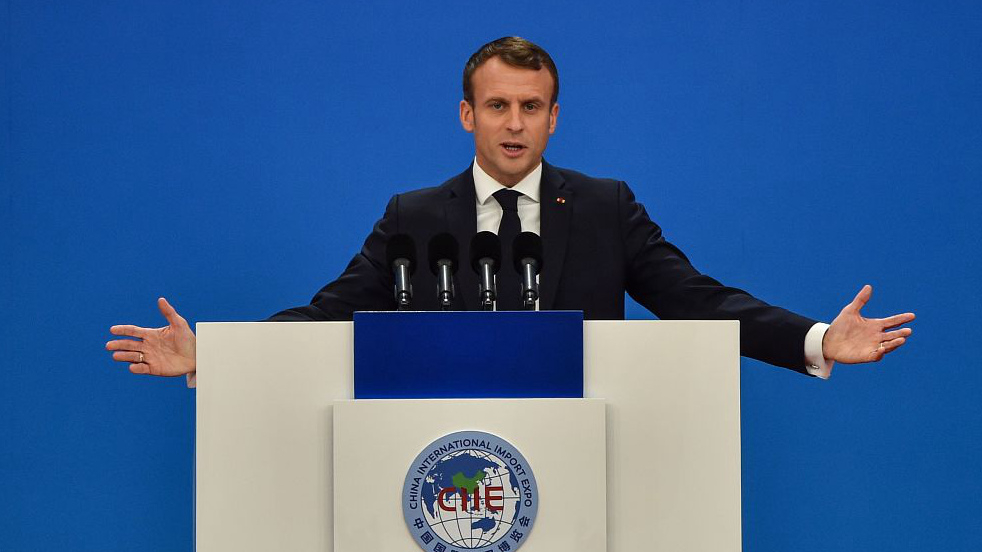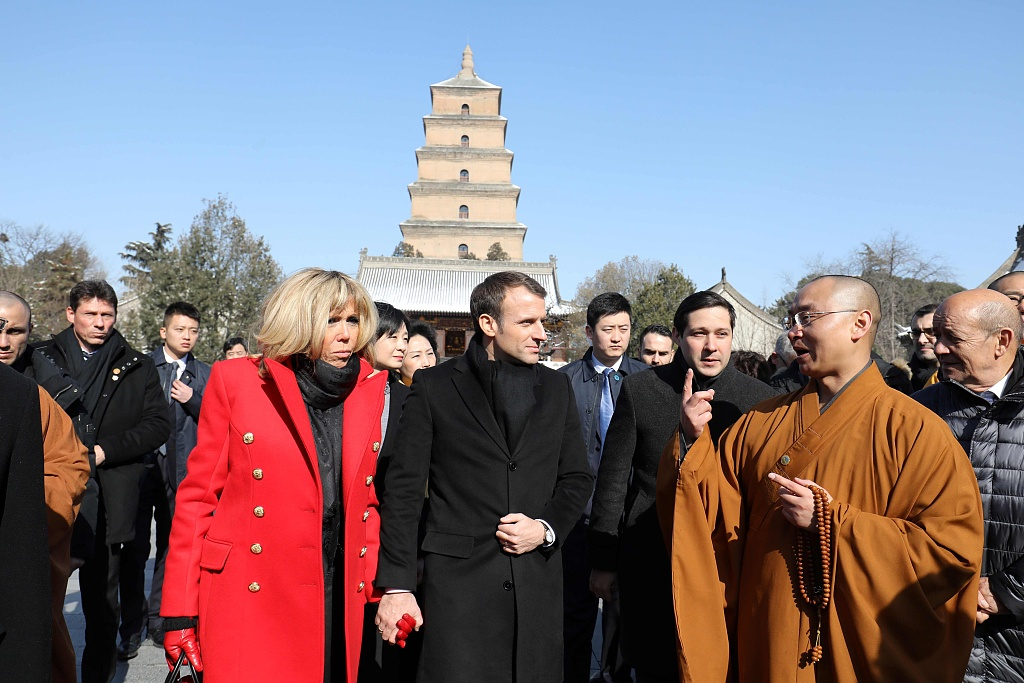
French President Emmanuel Macron speaks during the opening ceremony of the second China International Import Expo in Shanghai, China, November 5, 2019. /VCG Photo
French President Emmanuel Macron speaks during the opening ceremony of the second China International Import Expo in Shanghai, China, November 5, 2019. /VCG Photo
Editor's note: Hu Hong is an assistant research fellow at the Department for European Studies at the China Institute of International Studies. The article reflects the author's opinions, and not necessarily the views of CGTN.
During his last visit to China in early 2018, French President, Emmanuel Macron has promised to visit China at least once a year during his presidency. Now the president has been seen to fulfill his promise. From November 4 to 6, Macron arrived in China and attended the opening ceremony of the second China International Import Expo (CIIE) in Shanghai while he is also paying a state visit to China.
Since Macron took office, audacious diplomacy has been a prominent feature of his presidency. The president would probably agree on this – in his speech in Ambassadors' conference this August, he claimed that "This audacious and changing diplomacy is essential if we wish to rebuild." During the last two years, Macron has become an active player in international relations – his handshakes with Donald Trump, his reaching out to Putin and his resolution on the Paris Agreement are all symbols of this.
To some extent, one of the key factors that behind these words and moves is the changing understanding on international relations of the French president. As power politics and competition among global major powers is gradually becoming the theme, even as romantic as France, politicians have to choose realism and pragmatism instead of liberalism and idealism.
From this perspective, it would be easier to understand that President Macron has attached increasingly great importance to China – one of the "two main focal points" of the world in Macron's regards. Maintaining and strengthening economic contacts, and pushing forward cooperation on global governance are the two main goals of President Macron's pragmatic diplomacy towards China.
Therefore, we will witness trade deals of agriculture and finance between China and France, and also the recommitment to global governance. During the President's speech at the opening ceremony of the CIIE, Macron said climate cooperation between Europe and China is "decisive" and he also called for cooperation in modernizing the WTO.
Besides China-Franco relations, this visit has not only implications on the bilateral relations; it will also inject more impetus to the China-EU relations.

French President Emmanuel Macron (C) and his wife Brigitte Macron (center-L) are visiting the Big Wild Goose Pagoda, Xi'an, China, January 8, 2018. /VCG Photo
French President Emmanuel Macron (C) and his wife Brigitte Macron (center-L) are visiting the Big Wild Goose Pagoda, Xi'an, China, January 8, 2018. /VCG Photo
During the last two years, Macron claimed himself as a spokesperson for not only France, but also Europe. While German Chancellor Angela Merkel's control over German politics is declining, and the transitions of the institutions of European Union have not yet completed, Macron is filling the vacancy and reestablishing the French leading role in European foreign policy.
Therefore, more European colors than the only French tricolor will be attached to this visit.
Firstly, besides his cabinet and business delegation, Macron is also joined by two senior officials from other European countries – the EU Agriculture Commissioner Phil Hogan and German Minister of Education Anja Karliczek.
Secondly, the China-EU relationship is also becoming a high topic that President Macron pays more attention to. According to the Associated Press, Macron declared that the EU and China had reached an agreement for the mutual protection of food and alcohol products and will be formally signed Wednesday.
Of course, except for political gesture as standing for the European Union, Macron has his own considerations for French politics and economics. As a major agricultural country in the European Union, France will be the biggest beneficiary nation from the deal.
In the upcoming year, the China-EU relations will surely witness a series of critical moment. Negotiations on a bilateral investment treaty are undergoing – a new round has been starting on Tuesday in Beijing. Both sides aim to close negotiations before the end of next year.
China-EU 2020 Strategic Agenda for Cooperation will be due next year and new strategic agenda is to be signed. The chemistry between new leaders of the European Union and China is yet to be observed.
With the American leadership stirring the whole international relations up, China and Europe should have more cooperation. Hopefully, Macron's state visit to China could inject more impetus to the China-EU relations.
(If you want to contribute and have specific expertise, please contact us at opinions@cgtn.com)